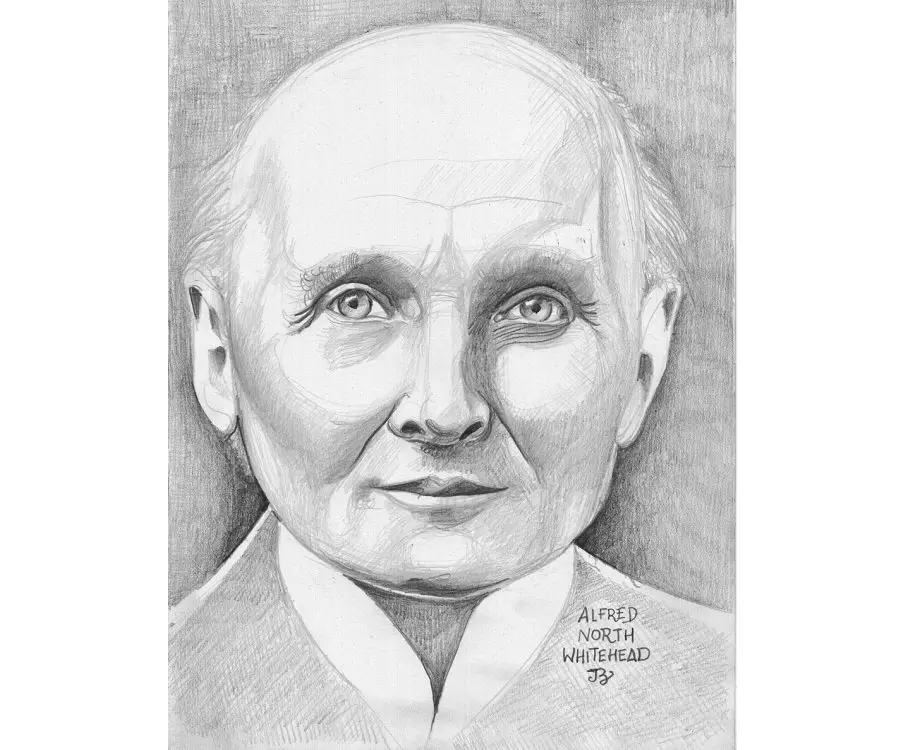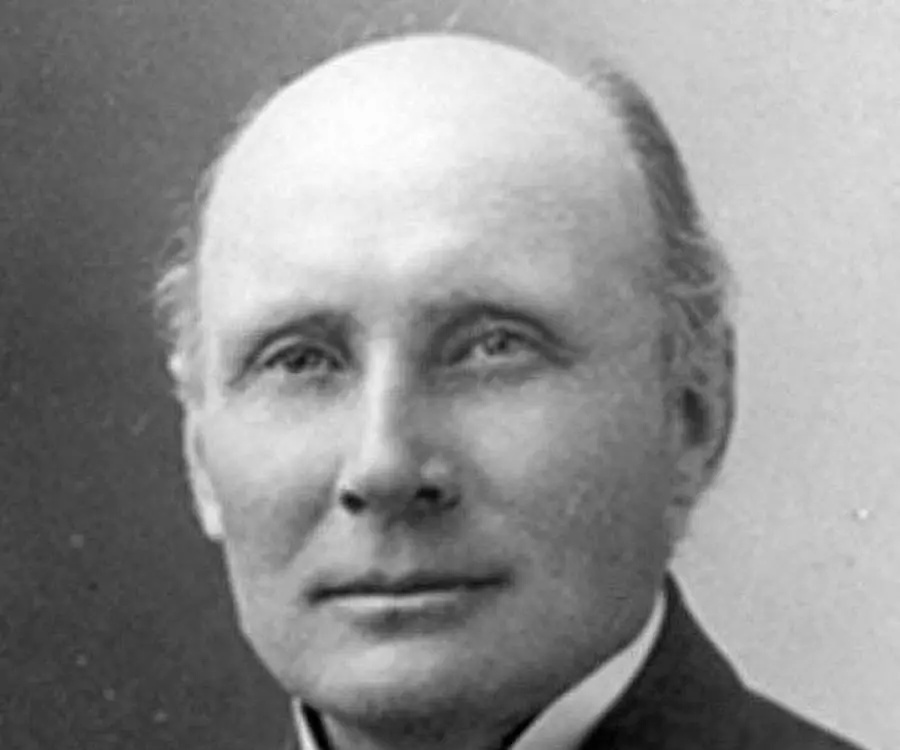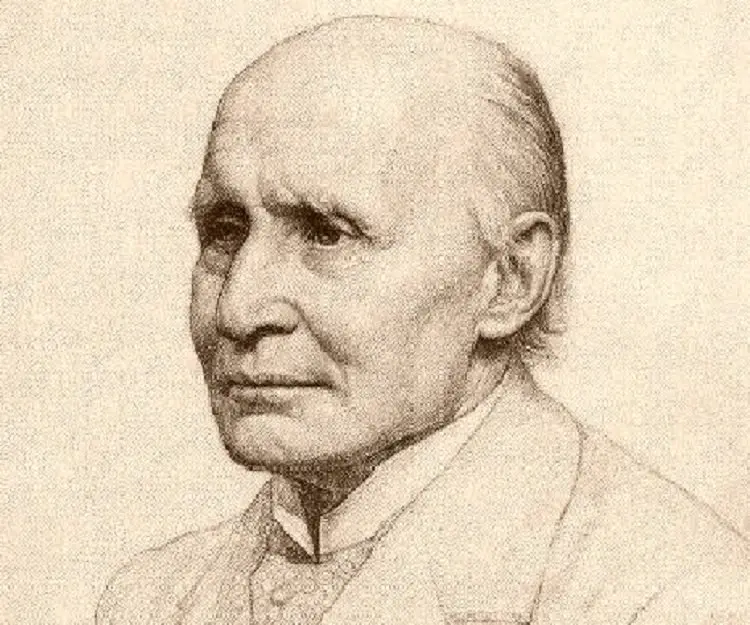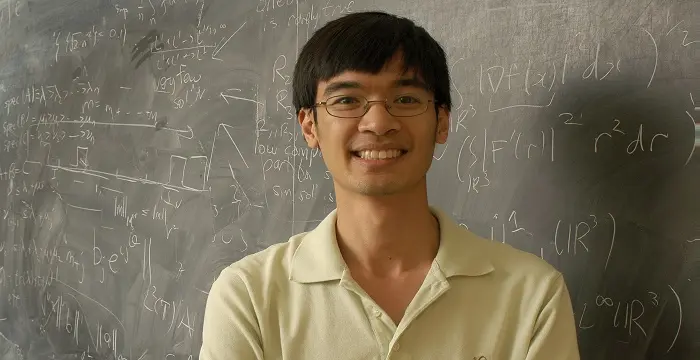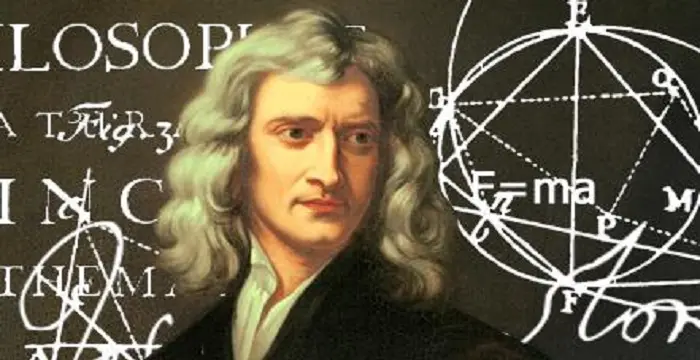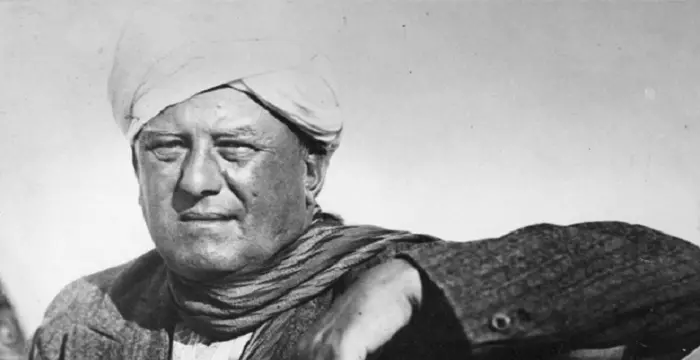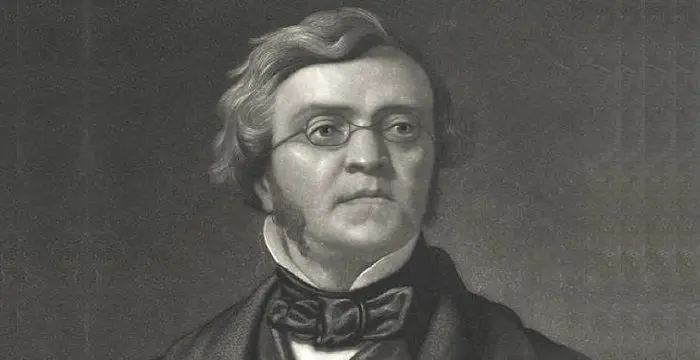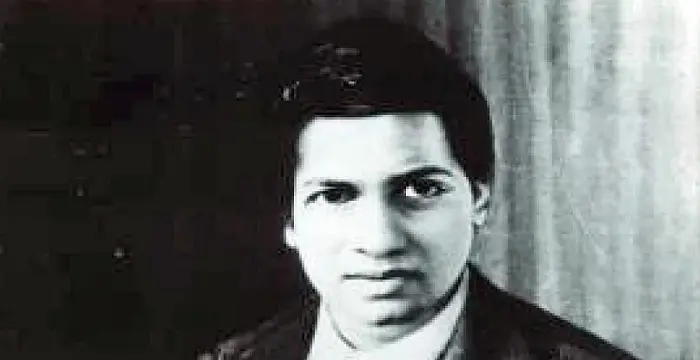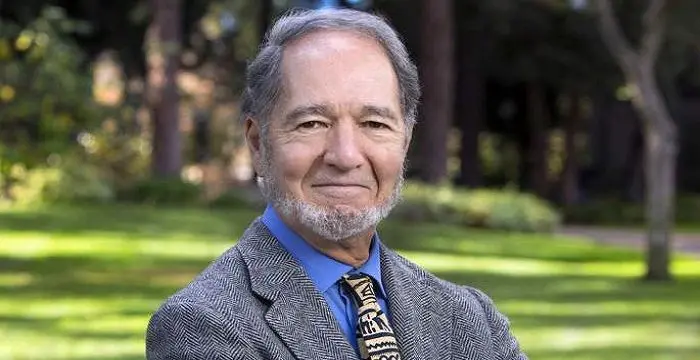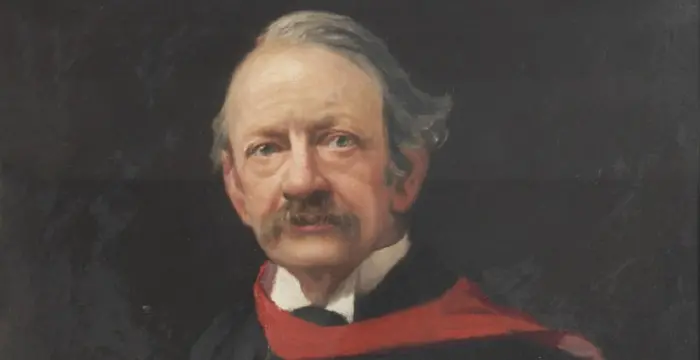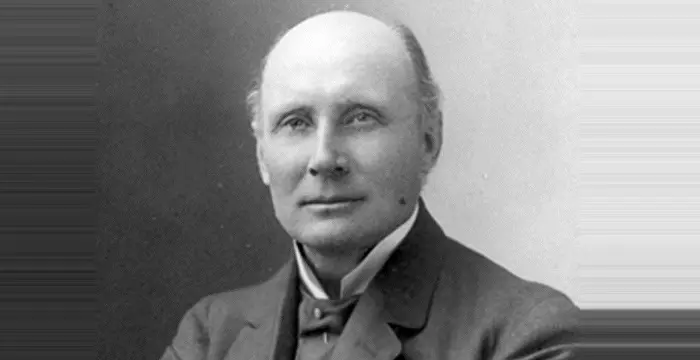
Alfred North Whitehead - Mathematicians, Family and Life
Alfred North Whitehead's Personal Details
Alfred North Whitehead was a famous British Mathematician, who co-authored the historical ‘Principia Mathematica’ with Bertrand Russell
| Information | Detail |
|---|---|
| Birthday | February 15, 1861 |
| Died on | December 30, 1947 |
| Nationality | British, American |
| Famous | Trinity College, Cambridge, Intellectuals & Academics, Philosophers, Mathematicians |
| City/State | Rhode Island |
| Spouses | Evelyn Wade |
| Siblings | Henry Whitehead |
| Universities |
|
| Notable Alumnis |
|
| Birth Place | Ramsgate, Kent, England |
| Born Country | United Kingdom |
| Political Ideology | libertarian |
| Gender | Male |
| Father | Alfred Whitehead |
| Mother | Maria Sarah Buckmaster |
| Sun Sign | Aquarius |
| Born in | Ramsgate, Kent, England |
| Famous as | Mathematician, Philosopher |
| Died at Age | 86 |
// Famous Philosophers
Martin Buber
One of the greatest philosophers to have ever walked on earth, Martin Buber contributions to philosophy is a long-standing one. Explore all about his profile, childhood, life and timeline here.
Lao Tzu (Laozi)
Lao Tzu was a legendary Chinese philosopher who wrote the important “Daodejing”. This biography profiles his childhood, life, career, achievements and timeline.
Alan Watts
Alan Watts was a famous British philosopher known for his Zen teachings and interpretations of Eastern philosophy. Read more about this great philosopher in the following article.
Alfred North Whitehead's photo
Who is Alfred North Whitehead?
Alfred North Whitehead was a British Mathematician who is known for his tremendous contributions in algebra, logic, philosophy of science, physics, metaphysics, and education. Although Whitehead was a scientist whose areas of expertise were mathematics and physics, yet his outlook towards these subjects were philosophical than purely scientific. Starting his career as a Fellow and then as a lecturer in mathematics at Trinity College Cambridge, he later diversified into philosophy and metaphysics. As a lecturer at Trinity, he coauthored with Bertrand Russell the three volumes of the ‘Principia Mathematica’, today known as one of the most important works in mathematical logic. Thereafter, as he settled in London, teaching at the Imperial College, his attention was gradually turned to philosophy of science, which in its turn led him to metaphysics, a subject that deals with the philosophical investigation into the nature of the universe and existence. Whitehead spent the last years of his career at Harvard, writing his seminal work, ‘Process’ and Reality’ in the late 1920s. Realistic, helpful, courteous, and devoid of malice, he was equally popular with his colleagues and students.
// Famous Mathematicians
Grigori Perelman
Grigori Perelman is a Russian mathematician who is best known for his contributions to Riemannian geometry and geometric topology. Check out this biography to know about his childhood, family life, achievements and fun facts about him.
Terence Tao
Terence Tao is an Australian- American mathematician who has contributed enormously to the field of mathematics. Check out this biography to know about his childhood, family life and achievements.
Isaac Newton
Isaac Newton was an English scientist and mathematician, who discovered gravitation and Newtonian Mechanics. Read this biography to find more on his life.
Childhood & Early Years
Alfred North Whitehead was born on 15 February 1861, in Ramsgate, a seaside town in eastern Kent, England. His father, also Alfred Whitehead, was an Anglican clergyman, who taught at Chatham House Academy, established by his own father, Thomas Whitehead. He was an upright man with a deep sense of duty.
Alfred’s mother, Maria Sarah nee Buckmaster, has been described as unimaginative woman with no sense of humor. That Alfred was not very fond of her is evident from the fact he never mentioned her in any of his writings.
Alfred was born youngest of his parents’ four children, having two brothers seven and eight years his senior and a sister, older by two years. He was the baby of the family and was not sent to school until he was fourteen, studying at home with his father.
Along with other subjects, he started learning Latin from the age of 10 and Greek from the age of 12. In 1875, 14 year old Alfred began his formal education at Sherborne School, an independent boys' school then linked with Sherborne Abbey, in the town of Sherborne in north-west Dorset.
At school, the major subjects were Latin, Greek and English; less attention being paid to mathematics, science, history and geography. It was here that he grew to love the poetries of Wordsworth and Shelly. He also excelled in games, but showed greatest aptitude for mathematics.
In 1879, his final year at school, Alfred was allowed to drop composition and reading of Latin poetry to devote more time to mathematics. This was also the year he became the head prefect of his class and the captain of games.
In 1879, he sat for the entrance examination for Trinity College, Cambridge and won a scholarship. Subsequently, in October 1880, Alfred North Whitehead entered Trinity College. Later, he also won a College Foundation scholarship.
At Cambridge, he studied both pure and applied mathematics. His coach was Edward John Routh. Among his teachers were J. W. L. Glaisher, H. M. Taylor and W. D. Niven. He also attended lecture by George Stokes and Arthur Cayley, concurrently developing considerable knowledge in history, literature, and philosophy.
He took the Mathematical Tripos examinations in 1883, graduating in 1884 as the Fourth Wrangler. In the same year, he presented a dissertation on Maxwell's theory of electricity and magnetism, which earned him a Fellowship at the Trinity. Also in May 1884, he was elected to the Cambridge Apostle.
Lecturer At Cambridge
In 1884, Alfred North Whitehead began his career as a Fellow at the Trinity College, Cambridge, where he taught applied mathematics. It is not known if he undertook mathematical research during this early period because he did not publish a single paper in the first five years.
In 1888, he was made a Lecturer at the University of Cambridge. In the following year, he published two papers, both of which were on the motion of viscous fluids. But later, his interest turned to pure mathematics.
In January 1891, he started working on his first major work, ‘Treatise on Universal Algebra’. The work would take seven years to complete, finally being published in 1898. Meanwhile in 1894, he was appointed as examiner at Mathematical Tripos.
In 1903, Whitehead was promoted to the post of Senior Lecturer at Trinity. In the same year, he abandoned his work on the second volume of ‘Treatise on Universal Algebra’, which he had started in 1898, to start collaboration with Bertrand Russell, a former student and colleague.
In 1900, Whitehead and Russell went to Paris to attend International Congress of Philosophy, where they met Giuseppe Peano and Alessandro Padoa, the proponents of the set theory. Working independently, Russell published ‘Principles of Mathematics’, in 1903, and then started working on its second volume.
Very soon, it became apparent that Whitehead and Russell were working on the same topic and therefore, they decided to work together. Initially, they had thought they would complete the project within one year; but it took them seven years to complete the first volume.
Entitled, ‘Principia Mathematica’, the first volume was published in 1910. In the same year, Whitehead resigned from his position at Cambridge and moved to London without securing his next position. Meanwhile in 1907, Whitehead had his second book ‘The Axioms of Descriptive Geometry’ published.
In London
In 1911, after remaining unemployed for one year, Alfred North Whitehead accepted a position as Lecturer in Applied Mathematics and Mechanics at University College London. In the same year, he had his fourth book, ‘An Introduction to Mathematics’ published.
At the same time, he continued his collaboration with Russell, publishing the second and third volume of ‘Principia Mathematica’ in 1912 and 1913 respectively. Also in 1912, he hoped to be appointed to the Goldsmid Chair of Applied Mathematics and Mechanics, but was bypassed.
Therefore when in 1914, he received an invitation from his old friend Andrew Forsyth, Chief Professor of Mathematics at the Imperial College London, he joined the institution as Professor of Applied Mathematics. Very soon, he embarked on a very productive period.
From 1917 to 1922, he had four major works published, namely, 'The Organization of Thought Educational and Scientific' (1917), 'An Enquiry Concerning the Principles of Natural Knowledge' (1919), 'The Concept of Nature' (1920), and 'The Principle of Relativity with Applications to Physical Science’ (1922).
Also from late 1918, Whitehead’s administrative responsibilities began to expand. In that year, he was elected the Dean of the Faculty of Science for four year. Concurrently, in 1919, he became a Member of the University of London's Senate and in 1920, the Chairman of the Senate's Academic Council.
Towards the end of his stay in London, while explaining the relation between formal mathematical theories in physics and their basis in experience, Whitehead’s attention was turned to the philosophy of science. Although he never had any formal training in philosophy, his works in this field were highly appreciated.
At Harvard
In early 1924, 63 year old Alfred North Whitehead received an invitation to join the faculty of philosophy at Harvard University for a five-year term. Since he had only two years of service left at the Imperial College, he gladly accepted the offer.
He was equally intrigued by the prospect of teaching philosophy at Harvard. But once there, it was found that he was equally adept in metaphysics. His works in this field is compared to that of Gottfried Wilhelm Leibniz and G.W.F. Hegel.
In 1925, he gave a course of eight lectures on philosophy, which were published in the same year as ‘Science and the Modern World’. It was followed by ‘Religion in the Making’ (1926) and ‘Symbolism, Its Meaning and Effect’ (1927).
In January 1927, he was invited by the University of Edinburg to give a set of 10 Gifford Lectures in the next academic year. Although the lectures were thinly attended they led to the publication of ‘Process’ and Reality’, which is considered his master work.
Whitehead continued to teach at Harvard until the age of 76, retiring in June 1937. During this period, he had four book published; ‘The Aims of Education and Other Essays’ (1929), ‘The Function of Reason’ (1929), ‘Adventures of Ideas' (1933) and 'Nature and Life" (1934).
Major Works
Whitehead is best remembered for his 1929 book, ‘Process and Reality’, in which he had presented his system of speculative philosophy or ‘cosmology’. Full of technical terms that he was compelled to invent, it is definitely the densest as well as the most difficult work in whole of Western canon.
While ‘Process and Reality’ is for experts, general readers will find his ‘Adventure of Ideas’ more rewarding. Published in 1933, it is his last big philosophical work. In it he summarized his ideas on metaphysics, explaining his notion about beauty, truth, art, adventure, and peace.
Awards & Achievements
In 1922, Whitehead was awarded the first ever James Scott Prize by the Royal Society of Edinburgh.
In 1925, he was awarded the Sylvester Medal by the Royal Society, London for his work on the foundations of mathematics. He had been a member of the Society Since 1903.
In 1930, he received Butler Medal from the Columbia University.
In 1931, Whitehead was elected to the British Academy.
In 1945, he was awarded the Order of Merit by the British monarch.
From 1922 to 1923, he served as president of the Aristotelian Society, London.
He also received honorary degrees from many universities including Manchester, St Andrews, Wisconsin, Harvard, Yale and Montreal.
Personal Life & Legacy
In 1890, Whitehead married Evelyn Willoughby Wade an Irish lady, brought up in France. She had a positive influence on her husband’s life and it was her sense of adventure and beauty, which helped him to form his philosophical thoughts.
The couple had three children; a daughter named Jessie Whitehead, and two sons named Thomas North Whitehead and Eric Whitehead. Eric joined the Royal Flying Corps during World War I and died in action in 1918 at the age of 19.
Whitehead spent the last years of his life in Cambridge, Massachusetts, continuing to publish papers. Although he loved his life in the USA, he remained a British citizen till the end.
He died on 30 December 1947. An agnostic by religion, his body was cremated in accordance of his wish and no funeral was arranged. According to his prior instructions, Evelyn Whitehead destroyed all his unpublished papers after his death.
Whitehead Research Project, established in 2005, continues to carry his legacy. It sponsors researches on the life and philosophy of Alfred North Whitehead, exploring the relevance of his thoughts in today’s world.
// Famous Intellectuals & Academics
Bertil Gotthard Ohlin
Bertil Gotthard Ohlin was a famous Swedish economist. This biography profiles his childhood, family life & achievements.
Emily Greene Balch
Emily Greene Balch was an American economist, sociologist and pacifist who won the 1946 Nobel Peace Prize. This biography of Emily Greene Balch provides detailed information about her childhood, life, achievements, works & timeline.
Martin Buber
One of the greatest philosophers to have ever walked on earth, Martin Buber contributions to philosophy is a long-standing one. Explore all about his profile, childhood, life and timeline here.
Alfred North Whitehead biography timelines
- // 15th Feb 1861Alfred North Whitehead was born on 15 February 1861, in Ramsgate, a seaside town in eastern Kent, England. His father, also Alfred Whitehead, was an Anglican clergyman, who taught at Chatham House Academy, established by his own father, Thomas Whitehead. He was an upright man with a deep sense of duty.
- // 1875Along with other subjects, he started learning Latin from the age of 10 and Greek from the age of 12. In 1875, 14 year old Alfred began his formal education at Sherborne School, an independent boys' school then linked with Sherborne Abbey, in the town of Sherborne in north-west Dorset.
- // 1879In 1879, his final year at school, Alfred was allowed to drop composition and reading of Latin poetry to devote more time to mathematics. This was also the year he became the head prefect of his class and the captain of games.
- // 1879 To 1880In 1879, he sat for the entrance examination for Trinity College, Cambridge and won a scholarship. Subsequently, in October 1880, Alfred North Whitehead entered Trinity College. Later, he also won a College Foundation scholarship.
- // 1884In 1884, Alfred North Whitehead began his career as a Fellow at the Trinity College, Cambridge, where he taught applied mathematics. It is not known if he undertook mathematical research during this early period because he did not publish a single paper in the first five years.
- // 1888In 1888, he was made a Lecturer at the University of Cambridge. In the following year, he published two papers, both of which were on the motion of viscous fluids. But later, his interest turned to pure mathematics.
- // 1890In 1890, Whitehead married Evelyn Willoughby Wade an Irish lady, brought up in France. She had a positive influence on her husband’s life and it was her sense of adventure and beauty, which helped him to form his philosophical thoughts.
- // 1898 To 1903In 1903, Whitehead was promoted to the post of Senior Lecturer at Trinity. In the same year, he abandoned his work on the second volume of ‘Treatise on Universal Algebra’, which he had started in 1898, to start collaboration with Bertrand Russell, a former student and colleague.
- // 1900 To 1903In 1900, Whitehead and Russell went to Paris to attend International Congress of Philosophy, where they met Giuseppe Peano and Alessandro Padoa, the proponents of the set theory. Working independently, Russell published ‘Principles of Mathematics’, in 1903, and then started working on its second volume.
- // 1903 To 1925In 1925, he was awarded the Sylvester Medal by the Royal Society, London for his work on the foundations of mathematics. He had been a member of the Society Since 1903.
- // 1907 To 1910Entitled, ‘Principia Mathematica’, the first volume was published in 1910. In the same year, Whitehead resigned from his position at Cambridge and moved to London without securing his next position. Meanwhile in 1907, Whitehead had his second book ‘The Axioms of Descriptive Geometry’ published.
- // 1911In 1911, after remaining unemployed for one year, Alfred North Whitehead accepted a position as Lecturer in Applied Mathematics and Mechanics at University College London. In the same year, he had his fourth book, ‘An Introduction to Mathematics’ published.
- // 1914Therefore when in 1914, he received an invitation from his old friend Andrew Forsyth, Chief Professor of Mathematics at the Imperial College London, he joined the institution as Professor of Applied Mathematics. Very soon, he embarked on a very productive period.
- // 1918The couple had three children; a daughter named Jessie Whitehead, and two sons named Thomas North Whitehead and Eric Whitehead. Eric joined the Royal Flying Corps during World War I and died in action in 1918 at the age of 19.
- // 1922In 1922, Whitehead was awarded the first ever James Scott Prize by the Royal Society of Edinburgh.
- // 1922 To 1923From 1922 to 1923, he served as president of the Aristotelian Society, London.
- // 1924In early 1924, 63 year old Alfred North Whitehead received an invitation to join the faculty of philosophy at Harvard University for a five-year term. Since he had only two years of service left at the Imperial College, he gladly accepted the offer.
- // Jan 1927In January 1927, he was invited by the University of Edinburg to give a set of 10 Gifford Lectures in the next academic year. Although the lectures were thinly attended they led to the publication of ‘Process’ and Reality’, which is considered his master work.
- // 1929Whitehead is best remembered for his 1929 book, ‘Process and Reality’, in which he had presented his system of speculative philosophy or ‘cosmology’. Full of technical terms that he was compelled to invent, it is definitely the densest as well as the most difficult work in whole of Western canon.
- // 1930In 1930, he received Butler Medal from the Columbia University.
- // 1931In 1931, Whitehead was elected to the British Academy.
- // 1933While ‘Process and Reality’ is for experts, general readers will find his ‘Adventure of Ideas’ more rewarding. Published in 1933, it is his last big philosophical work. In it he summarized his ideas on metaphysics, explaining his notion about beauty, truth, art, adventure, and peace.
- // 1945In 1945, he was awarded the Order of Merit by the British monarch.
- // 30th Dec 1947He died on 30 December 1947. An agnostic by religion, his body was cremated in accordance of his wish and no funeral was arranged. According to his prior instructions, Evelyn Whitehead destroyed all his unpublished papers after his death.
- // 2005Whitehead Research Project, established in 2005, continues to carry his legacy. It sponsors researches on the life and philosophy of Alfred North Whitehead, exploring the relevance of his thoughts in today’s world.
// Famous Trinity College, Cambridge
Isaac Newton
Isaac Newton was an English scientist and mathematician, who discovered gravitation and Newtonian Mechanics. Read this biography to find more on his life.
Aleister Crowley
Aleister Crowley was an occultist and ceremonial magician who founded the ethical philosophy of Thelema. This biography of Aleister Crowley provides detailed information about his childhood, life, achievements, works & timeline.
William Makepeace Thackeray
William Thackeray was an English novelist and satirist. Read this brief biography to find more on his life & timeline.
Srinivasa Ramanujan
Srinivasa Ramanujan was an Indian mathematician who made significant contributions to mathematical analysis, number theory, and continued fractions. Check out this biography to know about his childhood, life, achievements, works & timeline. .
Jared Diamond
Jared Mason Diamond is an American scientist and author reputed for his highly acclaimed and popular science books.
J. J. Thomson
J.J. Thomson was an English physicist and mathematician. This biography profiles his childhood, life, academic career, research and timeline.
Alfred North Whitehead's FAQ
What is Alfred North Whitehead birthday?
Alfred North Whitehead was born at 1861-02-15
When was Alfred North Whitehead died?
Alfred North Whitehead was died at 1947-12-30
Where was Alfred North Whitehead died?
Alfred North Whitehead was died in Cambridge, Massachusetts, United States
Which age was Alfred North Whitehead died?
Alfred North Whitehead was died at age 86
Where is Alfred North Whitehead's birth place?
Alfred North Whitehead was born in Ramsgate, Kent, England
What is Alfred North Whitehead nationalities?
Alfred North Whitehead's nationalities is British, American
Who is Alfred North Whitehead spouses?
Alfred North Whitehead's spouses is Evelyn Wade
Who is Alfred North Whitehead siblings?
Alfred North Whitehead's siblings is Henry Whitehead
What was Alfred North Whitehead universities?
Alfred North Whitehead studied at Trinity College, Cambridge, Trinity College, Cambridge, Sherborne School, University of Cambridge
What was Alfred North Whitehead notable alumnis?
Alfred North Whitehead's notable alumnis is Trinity College, Cambridge
What is Alfred North Whitehead's political ideology?
Alfred North Whitehead's political ideology is libertarian
Who is Alfred North Whitehead's father?
Alfred North Whitehead's father is Alfred Whitehead
Who is Alfred North Whitehead's mother?
Alfred North Whitehead's mother is Maria Sarah Buckmaster
What is Alfred North Whitehead's sun sign?
Alfred North Whitehead is Aquarius
How famous is Alfred North Whitehead?
Alfred North Whitehead is famouse as Mathematician, Philosopher



